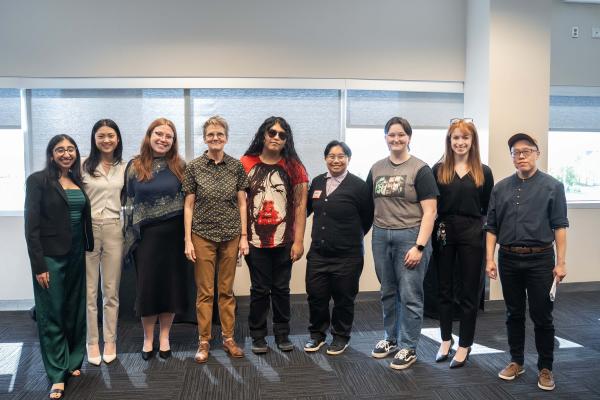About WGSS undergraduate programs
Now more than ever, WGSS helps us to ask and answer the most pressing questions of our time. With a commitment to analyzing relationships of power, challenging forms of oppression, and building knowledge that liberates, WGSS gives us the tools to understand our ever more complex world. WGSS is a field born from struggle, and our departmental community strives to honor and build upon that legacy. WGSS has been a thriving department at Ohio State for the past 50 years and ranks among the top in the nation. Our cutting- edge faculty and inspiring students are what make our program as excellent and long-lasting as it is.
Our program currently has the pleasure of educating, empowering and learning from our inspiring cohort of undergraduate WGSS majors. Additionally, our program also offers three distinct minor pathways, including the WGSS minor, the Women, Gender and Public Policy minor, as well as the LGBTQ+ studies minor! Our program also offers three distinct minor pathways, including the WGSS minor, the Women, Gender and Public Policy minor, as well as the LGBTQ+ studies minor.
The undergraduate research workshop and symposium

For the very first time, WGSS students enrolled in the new senior offering WGSST 4574 – Senior Capstone in Feminist Research Workshop, co-taught by Dr. Shannon Winnubst and Dr. Jian Neo Chen. Attendees of the Spring Reception had the great privilege of hearing WGSS juniors and seniors present their final Capstone projects they developed collaboratively in WGSST 4575. From horror movies tropes, the importance of literacy, video game communities, local punk transgressions, migrant domestic workers, to climate change, our very own feminist scholars engaged us all with their cutting-edge interdisciplinary research.
- Jaiden Blancaflor’s capstone revolves around a singular, but incredibly complex, question: Why are so many Pilipina women leaving the Philippines? Pilipina women make up a significant portion of the migrant domestic workforce, and their displacement from their home country holds conversation regarding the family unit, geopolitics, the intersecting systems of oppression.
- Sophie Chu’s research focuses on analyzing the gaming industry and how online video games intersect with players' gender, race and class. Major topics of discussion include the persistence of harassment and exclusion in gaming spaces, how capitalism manifests in-game, and how game worlds can be transformed into sites of resistance and liberation.
- Arianna Kelawala investigates U.S. literacy and illiteracy through a feminist, intersectional lens in her capstone, which highlights illiteracy through disability studies, explores literacy as a tool for joy and liberation, and provides feminist solutions to the growing literacy crisis throughout the country.
- The goal of Sarah Short’s project, titled “Whose Final Girl? A Feminist Horror Viewing Guide,” is to create a resource that enables potential film audiences to enhance their thinking about the media they are consuming.
- Aliyah Smith’s research focuses on climate change, with a particular focus on Hurricane Katrina as a case study. She analyzes how systems of power set up marginalized communities for failure by exploring a Black feminist response to environmental racism.
Senior symposium spotlight: Marijane Ortuno-Martinez ‘25
Q: What was the title and topic of the capstone project you presented at the first annual spring symposium?
A: My capstone project was titled "Indigenous'd, Trans'd, Punk'd: Towards a Partying Transsexual Theory of Hardcore Punk". My project was an autoethnography weaving together trans theory, South American Indigenous feminism, and the local hardcore punk community in Columbus, Ohio.
Q: Can you please share why you are passionate about your research topic?
A: I was passionate about my topic because I've known people into hardcore for years and been to a few shows myself. It was in the theoretical threads that I immersed myself in the work, as a transsexual and Quechua-descendant.
Q: How were you able to apply WGSS theories and concepts in your research?
A: After engaging with queer and feminist ethnography, my work began to form itself through WGSS theories of how to think through different fields of inquiry. As the paper took its final shape, I focused more on the Indigenous aspects of my work that further shaped the structure of the paper as well as my worldview.
Q: How was your experience with presenting your research to the department?
A: It was very exhilarating, terrifying and exciting. There's nothing quite like walking into a room and speaking about something you care about to people. Wonderful experience!
Celebrating our graduating seniors
Jaiden Blancaflor ‘25
- WGSS and speech and hearing science majors, ASL minor
Arianna Kelawala ‘25
- WGSS major, global public health minor
Marijane Ortuno-Martinez, ‘25
- WGSS major, philosophy minor
Olivia Patterson ‘25
- WGSS and medical anthropology majors
Sarah Short ‘25
- WGSS major
Yixin Zhang, ‘25
- WGSS and psychology majors
Emily Young, ‘24
- WGSS and psychology majors
“This major was one of the best decisions I could have ever made for myself because it stretches how you think and therefore how you approach your day-to-day life, as well as how you approach others. It empowers you as an individual, as a student, and embraces who you are while providing a sense of academic rigor that challenges your mind and perception of what’s around you.”
-Evelyn S. ‘26
